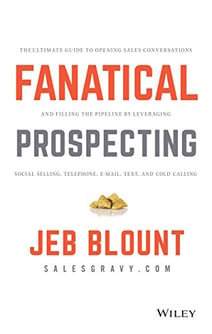Share article
We talk about books a lot, referencing them as part of our philosophies, our curriculum, and through our coaching. As we’re the sharing types, we thought it would be fun to let you in on some of the books that make an impact on our internal work at Q4i and the work we do with our clients.
Come along with us as we go back to school and explore books that have stirred something within us. Welcome to the Q4i Book Report! The book we'll be talking about is Fanatical Prospecting, by Jeb Blount.
 About the author
About the author
Jeb Blount is a Sales Acceleration Specialist who helps sales organizations reach peak performance fast by optimizing talent, leveraging training to cultivate high-performance sales culture, developing leadership and coaching skills, and applying more effective organizational design.
Why I read it
It was a recommendation from a client who was using the ideas with their sales team.
What is the premise?
Think of it as a handbook for quality prospecting: mindsets, behaviors, and habits.
Who should read it?
All insurance and benefits salespeople. And all leaders who are responsible for coaching, growing, and providing accountability for a sales team, regardless of size.
There are sections that can get very tactical and a bit tedious. If you’re looking for scripts, you’ll love it. If not, there are sections you’ll most likely skip over.
If you want someone to justify your belief that cold calling is dead (or whatever form of prospecting you don’t like), Jeb is NOT your guy. He tells it like it is and calls BS on the litany of excuses so prevalent in sales.
Ideas from the book I’ve referenced most often
The book is chock full of great advice, from concepts to overviews and down to the most detailed information such as cold call and email scripts. Following are a few of the highlights that resonate with me when coaching our clients, be it sales coaching or marketing services.
Adopt a Balanced Prospecting Methodology
We 100% believe pipeline-filling comes from a blend and balance of prospecting and marketing activities. Jeb has some great words to expand on this idea.
“The pipeline always reveals the truth. Salespeople who gravitate to a single prospecting methodology seriously sub-optimize their productivity.” He compares the single source of prospecting to a single financial investment, saying, “…it’s stupid. It’s career suicide.”
When salespeople say they’re better at one method over another, Jeb will wager that person is likely underperforming against goals. And that balancing your activities gives you “a statistical advantage that almost always leads to higher performance and income over the long term,” explaining that the very best salespeople master this balance.
Know Your Numbers: Managing Your Ratio
We always open sales training sessions with a discussion on numbers – the key performance indicators (KPIs) for the salesperson’s book of business. Typically, agencies have to pull these numbers for the exercise because they don’t know them and haven’t reviewed them before.
We start sales training with numbers because, as Jeb explains, knowing your numbers gives you the data you “need to evaluate how [you] are doing at any given time and most importantly, to make adjustments.” Numbers give you power. They keep you grounded in reality, focused on your daily goal, and empower you to make adjustments.
Not shy about stating the obvious, Jeb packs a punch of reality for why salespeople so often avoid tracking their activity. “The majority of salespeople don’t track their numbers. Why? Because it is so much easier to delude themselves into thinking that they have made far more calls or prospecting touches than they have really made.” The database doesn’t lie. It’s either there or not, and you can’t hide when everything is visible.
Own Your Database: Why the CRM Is Your Most Important Sales Tool
If you know us at all, you know we are believers in a database for marketing and sales as a must-have tool in your toolbox. Jeb agrees. He says, “There is no weapon or tool in your sales arsenal that is more important or impactful to your long-term income stream than your prospect database. Nothing.”
He is clear about the difficulty of it, though, explaining that “If you don’t own it, you will never reach your true earning potential.” Salespeople must take initiative for their work, be accountable to their craft, and not wait for a manager to impose accountability.
When you don’t embrace the potential of the CRM, you’re likely treating your database “like a trash can rather than a gold mine.” Being lazy about data entry leads to a trash can of data bits that lead nowhere. If you want to mine the gold, commit to embracing the tool as the keeper of ALL information. The more you have, the more you can mine.
The Law of Familiarity
People are more likely to interact with people they know. That’s just the way we humans are. To gain the advantage you want in sales, you need to make yourself familiar to your target audience. The more a prospect knows of you or your company, the more likely they are to answer your calls, open your emails, or accept an invitation. And we need these initial interactions to lead us to sales conversations, which can then lead to doing business together.
“The first step in creating familiarity is through persistent and consistent daily prospecting.” Amen, Jeb! A simple, profound idea to take to the bank.
And my other favorite section in this chapter is about referrals and introductions. “The real secret to generating referrals is: 1) Give a legendary customer experience. 2) Ask.”
We don’t need to make it more complicated than that!
And I appreciate his final idea from this chapter: “It is easy to spend all of your time creating familiarity. If you do this in place of other prospecting activities, you’ll wake up a month from now with an empty pipe and a screaming, pissed-off boss.” Find balance. Create familiarity, but you also have to do the asking and have the conversations. Don’t fool yourself into thinking warming people up is selling. It’s just the first step.
Favorite takeaway
With all the great tactical advice Jeb offers throughout the book, it’s his sharp observation of WHY you should invest the time to get fanatical about your prospecting that grabbed me the most. “If you don’t have a plan, you will become a part of someone else’s plan. You can either take control of your life or someone else will use you to enhance theirs. It’s your choice.”
Taking control doesn’t mean you must own a company, or that you can’t work for someone else. It means you need to have a plan for what you want in life and figure out how to make it happen. That path may very well include being a W2 and letting others worry about the heavy lifting of business ownership while you focus on your craft without all the other crap distracting you!
The beauty that comes from this personal planning is “when you choose to believe that you are in control of your destiny, you no longer fear failure and rejection because you believe that failure is the path to learning, growth, and improved performance.”
Recommendation
Fanatical Prospecting by Jeb Blount is a fantastic read, and I highly recommend it. ⭐️⭐️⭐️⭐️⭐
Content provided by Q4intelligence and partners
Photo by Sebnem Ragiboglu.

